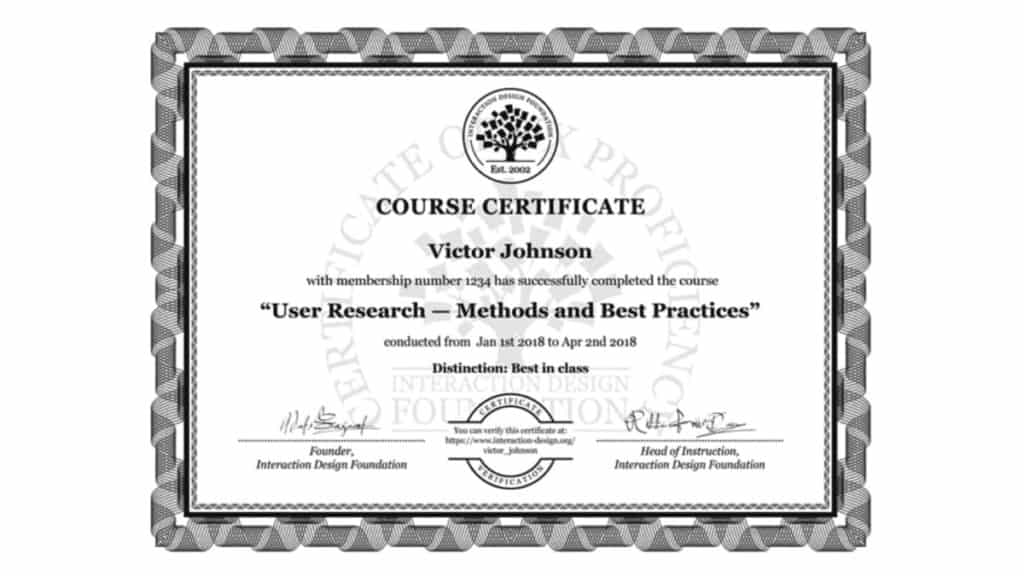This is a review of the online course User Research – Methods and Best Practices by Interaction Design Foundation.
This course was reviewed before we became an approved educational partner of The Interaction Design Foundation. As an educational partner we offer %25 off your first year of membership with The Interaction Design Foundation.
This is part of our series of reviews of online UX courses. Read some of our other reviews or see our full list of online UX courses.
Course Information
- Course Name: User Research – Methods and Best Practices
- Creator: Interaction Design Foundation
- Length: The estimated time to complete this course is a total of 13 hours 22 mins spread over 9 weeks.*
- Intended Audience: This is an intermediate-level course recommended for anyone involved or interested in product design and development.
- What You’ll Learn: What qualitative research is, how you can incorporate it into your own design process, and how to plan and carry out a range of research projects.
- Assumed Knowledge: Some basic knowledge of UX and research principals would be useful, but the course is intuitive enough for a beginner to benefit from it.
- Price: US $13/month paid yearly for as many courses as you like.
* They’re quite specific with their estimates!
Review
It’s been a while since I did any online training and I’d forgotten what to expect so I was both surprised and impressed by the format of this course. My first impression was excellent. Upon initial login I was met by a screen which very clearly laid out how the course works, how much time I should expect to invest, how long I’ll have access, and my favourite bit – the option to add the course schedule to my calendar. As a person that frequently starts things off with a bang and then lets them fizzle out as I get busy, an ongoing calendar prompt is a big win. So nice one on that front, IDF.
The first thing I noticed when I started work was that this course is very content heavy. The introductory video was long and fairly onerous. It could have been half as long and delivered the same message.
As I moved through the first exercise I found that the variety of content types (video, reading, exercises, diagrams etc) helped to break things up, but is still pretty heavy going. You have to be feeling sharp when you sit down to work. A mix of presenters keeps things interesting and students are frequently encouraged to think about how the topic of discussion relates to their environment, which helps the ideas to stick.
Mini quizzes at the end of each section ensure that you are keeping up and not just skimming, which is clever. These questions, along with a running timeline to demonstrate your progress are good for the motivation. As the course progresses the quizzes become assignments and their score weight increases. I was very impressed by how thoroughly the assignments are explained, often giving sample answers to keep you on the right track.
The structure of the lessons is well thought out. An idea is introduced and clearly explained through text or video. Real life examples are used frequently which helps with conceptualising, and sections are well summarised at their completion. There are plenty of supplementary links to extra reading and resources relating to key ideas.
The course took me longer than the suggested timeline, but that didn’t really bother me. It was very easy to pick up where I left off and it was easy to jump back to refresh my memory when necessary. This course doesn’t offer mentoring but you do have the support of an online community of learners which is helpful for feeling connected and bouncing ideas around. It culminates in a final assignment at the end of Lesson 8 and assuming you get a score of 70% or above across the whole course, a certificate is awarded.
Pros
- A very well planned and structured course with an intuitive UI;
- Excellent, clear explanations of processes and ideas;
- Good use of real life examples; and
- Interesting, relevant quizzes along the way which allow you to apply context to your thinking.
Cons
- Some videos were an hour long which made it hard to stay focussed; and
- Occasional minor spelling mistakes irked me.
Summary
This course is excellent and I highly recommend it for anyone that has space to really focus and make the most of it. This is not a course that you can skim – the content goes deep and you have to work hard to apply it to real world situations but it’s worth it. I look forward to taking my second IDF course.
- Content (how useful, up to date, practical, and comprehensive): 10/10
- Delivery (presentation style, pace, clarity, authority): 8/10
- Production (video quality, audio quality, editing): 9/10
- Overall rating: 9/10
Course Contents
- WELCOME AND INTRODUCTION
- WHY DO USER RESEARCH AND HOW TO FIT USER RESEARCH INTO YOUR EVERYDAY WORK
- THE BASICS OF QUALITATIVE USER RESEARCH
- USABILITY TESTING
- SEMI-STRUCTURED QUALITATIVE INTERVIEWS
- CONTEXTUAL INQUIRY
- USER OBSERVATIONS
- HOW TO MAKE YOUR RESEARCH MATTER
- COURSE CERTIFICATE, FINAL NETWORKING, AND COURSE WRAP-UP

